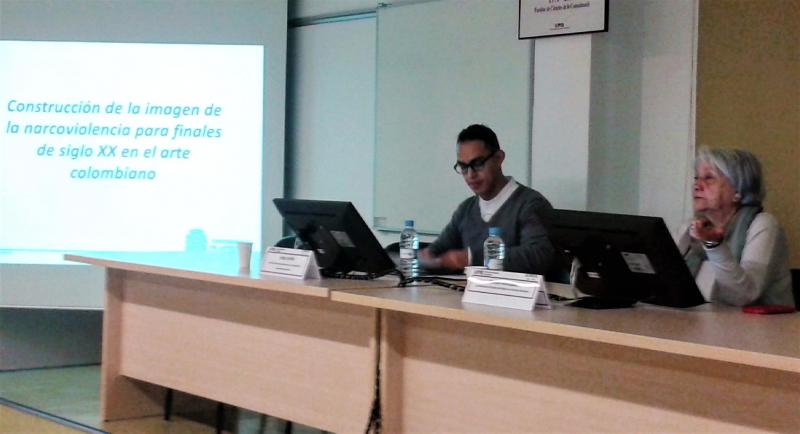During the days 12 and 13 of December 2017, the “Communication, Contemporary Art and Cyberculture” Conference was held at the Faculty of Communication Sciences of the UAB.
The conference focused on linking communication and contemporary artistic practices from the Colombian sphere; the space also served to close ties between research groups of the Autonomous University of Barcelona and the University of Antioquia (Medellín – Colombia).
Jorge Urueña, professor in the degrees of Social Communication and Humanities and of the Masters in Cultural Management and Education of the University of Antioquia, opened the first day of the day addressing the construction of the image of narcoviolence in Colombia from the transmedia universe, from the artistic manifestations and the national media.
According to Urueña, through the semiotic study of the art of the late twentieth century and the narco culture, it is analyzed from the categories: gender, guerrilla / paramilitarism, educational system, political heritage and religious power; the configuration and the existing relationship of narcoviolence as a globalized phenomenon that shares the values of the consumer society, also insists that what is being tried is “to tell the story of the more than 100 years of the Colombian conflict, through linked scientific fields with the arts … Telling the story of violence so as not to repeat it “.
Closing the day, the conference via Skype by Professor Diego Arango, director of the Doctoral Program in Arts of the University of Antioquia, focused on the conjunction of communication, contemporary art and technological transformations, as a debate in the artistic reconceptualization and meanings in the complex Colombian context.
Arango explained the new scenario with which the academy observes the contemporary artistic manifestations, which breaks with the traditional and contemplative schemes of art, to move to a stage of construction of collaborative works, in which both artist and audience and platforms, offer other interacting and communicative perspectives construction of knowledge, for which “knowledge is key to interpreting the works, if not they lack meaning and significance,” he added.
This session leaves as an academic background both the new perspective in which communication and other disciplines of the human sciences are being worked on, as well as contemporary art contributes to the resignification of the history and conflicts of the global society; In addition, the event served to strengthen contacts between transdisciplinary research groups in Spain, such as LAPREC, and their peers in Colombia, which is a step towards the new scenarios facing the field of communication.
